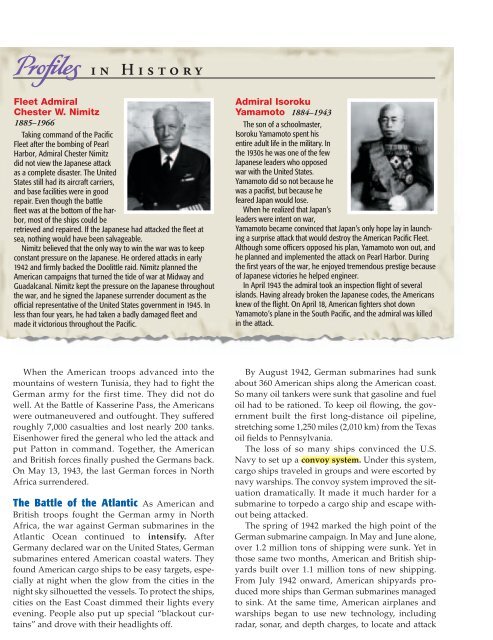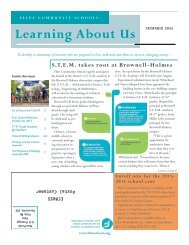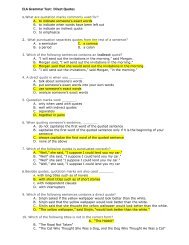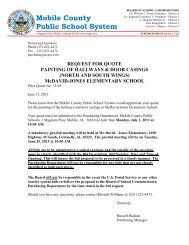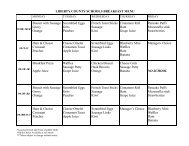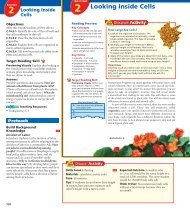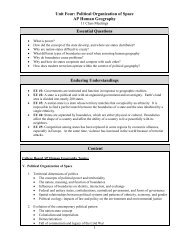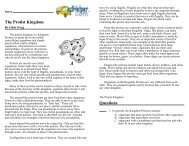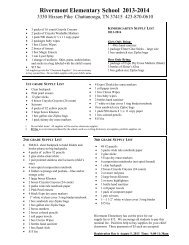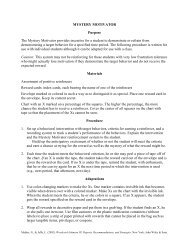Chapter 12: America and World War II, 1941-1945 - Georgia ...
Chapter 12: America and World War II, 1941-1945 - Georgia ...
Chapter 12: America and World War II, 1941-1945 - Georgia ...
You also want an ePaper? Increase the reach of your titles
YUMPU automatically turns print PDFs into web optimized ePapers that Google loves.
in History<br />
Fleet Admiral<br />
Chester W. Nimitz<br />
1885–1966<br />
Taking comm<strong>and</strong> of the Pacific<br />
Fleet after the bombing of Pearl<br />
Harbor, Admiral Chester Nimitz<br />
did not view the Japanese attack<br />
as a complete disaster. The United<br />
States still had its aircraft carriers,<br />
<strong>and</strong> base facilities were in good<br />
repair. Even though the battle<br />
fleet was at the bottom of the harbor,<br />
most of the ships could be<br />
retrieved <strong>and</strong> repaired. If the Japanese had attacked the fleet at<br />
sea, nothing would have been salvageable.<br />
Nimitz believed that the only way to win the war was to keep<br />
constant pressure on the Japanese. He ordered attacks in early<br />
1942 <strong>and</strong> firmly backed the Doolittle raid. Nimitz planned the<br />
<strong>America</strong>n campaigns that turned the tide of war at Midway <strong>and</strong><br />
Guadalcanal. Nimitz kept the pressure on the Japanese throughout<br />
the war, <strong>and</strong> he signed the Japanese surrender document as the<br />
official representative of the United States government in <strong>1945</strong>. In<br />
less than four years, he had taken a badly damaged fleet <strong>and</strong><br />
made it victorious throughout the Pacific.<br />
Admiral Isoroku<br />
Yamamoto 1884–1943<br />
The son of a schoolmaster,<br />
Isoroku Yamamoto spent his<br />
entire adult life in the military. In<br />
the 1930s he was one of the few<br />
Japanese leaders who opposed<br />
war with the United States.<br />
Yamamoto did so not because he<br />
was a pacifist, but because he<br />
feared Japan would lose.<br />
When he realized that Japan’s<br />
leaders were intent on war,<br />
Yamamoto became convinced that Japan’s only hope lay in launching<br />
a surprise attack that would destroy the <strong>America</strong>n Pacific Fleet.<br />
Although some officers opposed his plan, Yamamoto won out, <strong>and</strong><br />
he planned <strong>and</strong> implemented the attack on Pearl Harbor. During<br />
the first years of the war, he enjoyed tremendous prestige because<br />
of Japanese victories he helped engineer.<br />
In April 1943 the admiral took an inspection flight of several<br />
isl<strong>and</strong>s. Having already broken the Japanese codes, the <strong>America</strong>ns<br />
knew of the flight. On April 18, <strong>America</strong>n fighters shot down<br />
Yamamoto’s plane in the South Pacific, <strong>and</strong> the admiral was killed<br />
in the attack.<br />
When the <strong>America</strong>n troops advanced into the<br />
mountains of western Tunisia, they had to fight the<br />
German army for the first time. They did not do<br />
well. At the Battle of Kasserine Pass, the <strong>America</strong>ns<br />
were outmaneuvered <strong>and</strong> outfought. They suffered<br />
roughly 7,000 casualties <strong>and</strong> lost nearly 200 tanks.<br />
Eisenhower fired the general who led the attack <strong>and</strong><br />
put Patton in comm<strong>and</strong>. Together, the <strong>America</strong>n<br />
<strong>and</strong> British forces finally pushed the Germans back.<br />
On May 13, 1943, the last German forces in North<br />
Africa surrendered.<br />
The Battle of the Atlantic As <strong>America</strong>n <strong>and</strong><br />
British troops fought the German army in North<br />
Africa, the war against German submarines in the<br />
Atlantic Ocean continued to intensify. After<br />
Germany declared war on the United States, German<br />
submarines entered <strong>America</strong>n coastal waters. They<br />
found <strong>America</strong>n cargo ships to be easy targets, especially<br />
at night when the glow from the cities in the<br />
night sky silhouetted the vessels. To protect the ships,<br />
cities on the East Coast dimmed their lights every<br />
evening. People also put up special “blackout curtains”<br />
<strong>and</strong> drove with their headlights off.<br />
By August 1942, German submarines had sunk<br />
about 360 <strong>America</strong>n ships along the <strong>America</strong>n coast.<br />
So many oil tankers were sunk that gasoline <strong>and</strong> fuel<br />
oil had to be rationed. To keep oil flowing, the government<br />
built the first long-distance oil pipeline,<br />
stretching some 1,250 miles (2,010 km) from the Texas<br />
oil fields to Pennsylvania.<br />
The loss of so many ships convinced the U.S.<br />
Navy to set up a convoy system. Under this system,<br />
cargo ships traveled in groups <strong>and</strong> were escorted by<br />
navy warships. The convoy system improved the situation<br />
dramatically. It made it much harder for a<br />
submarine to torpedo a cargo ship <strong>and</strong> escape without<br />
being attacked.<br />
The spring of 1942 marked the high point of the<br />
German submarine campaign. In May <strong>and</strong> June alone,<br />
over 1.2 million tons of shipping were sunk. Yet in<br />
those same two months, <strong>America</strong>n <strong>and</strong> British shipyards<br />
built over 1.1 million tons of new shipping.<br />
From July 1942 onward, <strong>America</strong>n shipyards produced<br />
more ships than German submarines managed<br />
to sink. At the same time, <strong>America</strong>n airplanes <strong>and</strong><br />
warships began to use new technology, including<br />
radar, sonar, <strong>and</strong> depth charges, to locate <strong>and</strong> attack<br />
584 CHAPTER <strong>12</strong> <strong>America</strong> <strong>and</strong> <strong>World</strong> <strong>War</strong> <strong>II</strong><br />
(l)Oscar White/CORBIS, (r)CORBIS


